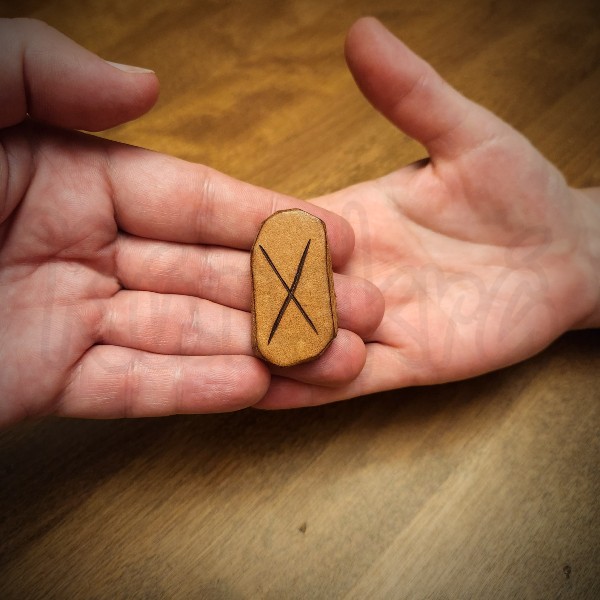
Rune Poems
✦ Old English Rune Poem
Generosity adorns,
bolsters & betokens
the praiseworthy —
the wretched of the earth
who lack all else
merit our mercy, our meals.
✦ Anglo-Saxon Rune Poem
Gyfu gumena byþ gleng and herenys,
wraþu and wyrþscype and wræcna gehwam
ar and ætwist, ðe byþ oþra leas.
Generosity brings credit and honour, which support one's dignity;
it furnishes help and subsistence
to all broken men who are devoid of aught else.
✦ Norwegian Rune Poem
(none)
✦ Icelandic Rune Poem
(none)
Gebo is the seventh rune in the Elder Futhark. Its reconstructed Proto-Germanic name is gebō, “gift.” In Old English this was gyfu; in Old Norse, gjöf. It represents the /g/ phoneme, as in “gift.” Unlike some other runes, its form does not clearly derive from Etruscan or Greek letterforms; scholar J. H. Looijenga suggests a relationship to the Latin X, whose sound may have aligned with Germanic /g/ in the first century.
Gebo does not appear in the Norwegian or Icelandic rune poems, which reflect the Younger Futhark — a reduced system of sixteen runes. In this contraction, certain sounds were merged or lost. That Gebo disappears here is striking: not merely the loss of a letter, but the disappearance of “gift” from the symbolic register.
In the Old English tradition, however, Gebo is central. The rune poem praises generosity as a pillar of honor and social stability. To give is not only to help the recipient; it establishes the giver as someone of worth, someone who recognizes abundance rather than scarcity. In a harsh and uncertain world, the generous individual becomes a beam of support, easing the lives of others and offering hope.
By extension, Gebo also governs relationships and partnerships. Any bond — friendship, alliance, marriage, or devotion — is an exchange. To give of oneself is to assert that what one offers has value. An artist offering their work to a deity affirms their own individuality and devotion; two people offering themselves to one another affirm mutual esteem.
Yet Gebo is not martyrdom. To give endlessly without receiving corrodes the spirit and poisons generosity itself. True giving requires discernment: knowing what you have to offer, and knowing who is worthy of receiving it. Gifts given to create obligation, debt, or control are no gifts at all.
Gebo therefore calls for balance. Reciprocity may take many forms — love, honor, trust, sustenance — but it must exist. When exchange is open and fair, generosity becomes nourishing rather than depleting. In this way, Gebo can be invoked to bless relationships, agreements, creative offerings, and sacred exchanges with the divine.
Keywords: Gift, Generosity, Reciprocity, Exchange, Honor, Partnership
Rune Reflections
- What did I give today, intentionally or unintentionally?
- What did I receive, and how did my body respond?
- Where do I feel generosity flowing easily, and where does it feel strained?
- What gift can I offer that feels true to who I am?
- What expectations arise when I give, and can I examine them honestly?
- Where do I need firmer boundaries so that my giving remains sustainable?
- What small, invisible gifts do I receive each day, and how might I honor them?